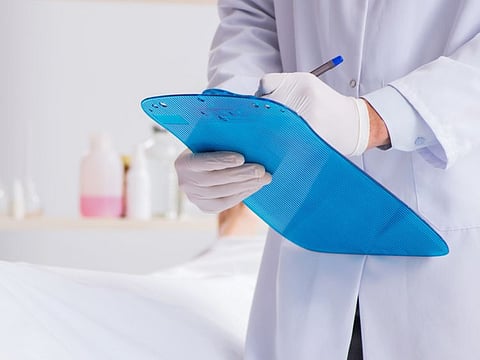UAE: Virtual autopsies aid Abu Dhabi health workers in postmortems
Abu Dhabi health department says the tech also helps detection of COVID-19-related deaths

Also In This Package
Abu Dhabi: Virtual autopsies will now support Abu Dhabi’s healthcare facilities to confirm the cause of death without putting at risk the health and safety of professionals in contact with the deceased.
The technology has contributed to the detection of COVID-19-related deaths, helping to confirm cause of death without direct contact by healthcare workers.
The Department of Health – Abu Dhabi (DoH) announced the introduction of postmortem imaging on Sunday. It said the technology has already been used over the past year for the medical investigation of over 700 cases.
Quick procedure
During virtual autopsies, the body of the deceased undergoes clinical radiology or CT scans that are conducted by qualified technicians, using protocols and regulations set by DoH. Throughout the 15 to 30-minute procedure, international practices are followed, and the sanctity and privacy of the deceased is maintained.
The procedure is conducted while the body is in the cadaver bag, commonly known as a ‘body bag’, and does not subject it to a postmortem physical examination.
DoH said Abu Dhabi has led an effective human-centred response since the onset of the COVID-19 pandemic, and that it is continuing to develop early detection strategies and implement preventive measures.
The UAE is among a group of countries that has adopted virtual autopsies, along with the US, UK, Canada, Germany, Australia and Japan.
Facilitating investigation
Abu Dhabi Central Morgue has been integrating virtual autopsy techniques into investigation procedures. Medical examiners apply virtual autopsies in order to identify signs of respiratory distress or symptoms, which can help indicate the possibility of a COVID-19 infection.
The diagnosis generated from a virtual autopsy enables medical technicians to determine whether contacts of the deceased require further examination in an effort to limit repercussions. Apart from COVID-19, the advanced technology will contribute to the investigation of various infectious diseases without compromising the safety of the morgue’s staff.
“The adoption of virtual autopsy in the UAE will provide healthcare facilities with accurate diagnoses post-examination of bodies. Diagnoses will include cause of death, gender, age group and detection of physical violence,” the DoH said in a statement.
Modernising autopsies
DoH Undersecretary Dr Jamal Alkaabi said: “The healthcare sector in Abu Dhabi is committed to exploring, developing, and employing some of the latest medical technologies and innovations to combat COVID-19. Abu Dhabi exhibits exemplary leadership when it comes to its human-centred COVID-19 response and world-class healthcare facilities and technologies.”
Dr Marwan Al Kaabi, acting group chief operations officer at SEHA, said: “In line with the Abu Dhabi Health Services Company’s (SEHA) commitment to equipping the community with world-class healthcare services, we work relentlessly to enhance our quality of services by implementing the highest quality standards and utilising innovation alongside the latest technologies to provide our patients with services that are quick and efficient. This will allow us to maintain the health and well-being of all members of the community and progress further in the path of success.”
Pioneering doctor
Dr. Nayef Aljanaahi, the first DoH-licensed Emirati consultant in forensic radiology, said the tech had modernised the autopsy process.
“I take pride in being the first Emirati-licensed doctor by DoH in Forensic Radiology. This would not have been possible were it not for the continuous support and guidance of our wise leadership and their efforts to develop the healthcare sector. Virtual autopsy has modernised the medical investigation of bodies, while ensuring the health and safety of medical staff and contacts of the deceased, all the while maintaining respect and privacy towards the bodies of deceased individuals,” he said.








